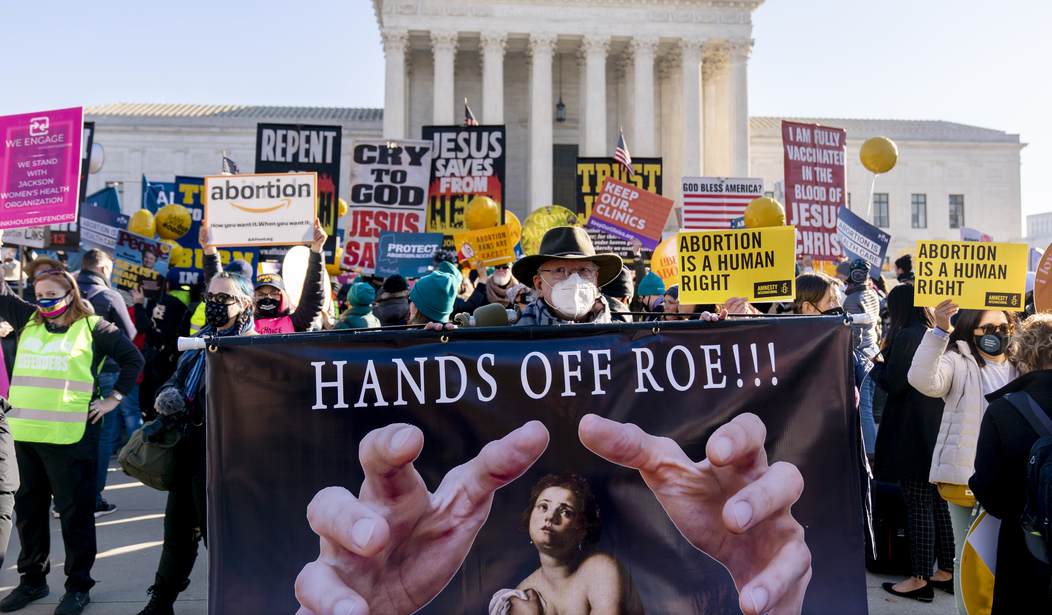A Fox News poll completed last week, the day before Politico published a draft majority opinion indicating that the Supreme Court will soon overturn Roe v. Wade, found that just 27% of respondents favored that outcome. Yet 54% thought their own states should ban abortion after 15 weeks of gestation -- the very policy at issue in the case before the Court.
A sizable number of the respondents evidently did not realize that a 15-week ban is inconsistent with Roe, and similar anomalies in other surveys suggest such confusion is common. At the same time, polling data indicates that Americans' opinions about abortion are more diverse and nuanced than Roe's supporters frequently imply.
That 1973 decision said states were not allowed to regulate abortion based on "the potentiality of human life" until the third trimester, which at the time was roughly equivalent to "viability," the point at which a fetus can survive outside the womb. Planned Parenthood v. Casey, the 1992 decision that retained Roe's "central holding," forbade any regulation that places "a substantial obstacle in the path of a woman seeking an abortion of a nonviable fetus."
The dividing line for "viability" nowadays is generally said to be around 23 or 24 weeks. That means a 15-week ban is clearly out of the question under the Court's abortion precedents.
So is an 18-week cutoff, which 41% of the respondents in a 2021 Gallup poll favored, although only 32% said Roe should be overturned. A 2021 Marquette University Law School poll likewise found a gap between the share of respondents who said the Court should ditch Roe (21%) and the share who thought it should uphold a 15-week ban (37%).
Recommended
An ABC News/Washington Post poll conducted last month found that 54% of respondents supported Roe, which was similar to the 57% who opposed a 15-week ban. But that survey presented a different puzzle: The share of respondents who opposed a 15-week ban was essentially the same as the share who opposed a six-week ban (58%).
According to federal data, a ban on abortion after 15 weeks would affect less than 5% of abortions. By contrast, opponents of the Texas law that prohibits abortion when fetal cardiac activity can be detected, which typically happens around six weeks, estimated that it would cover "at least 85%" of abortions.
You would therefore expect substantially more opposition to the second policy, contrary to what the poll found. While results like these cast doubt on the basis for the abortion opinions measured by polls, other findings tend to conceal their diversity.
In the Gallup poll, for example, 32% of respondents said abortion should be "legal under any circumstances," while 48% said abortion should be "legal only under certain circumstances." Although supporters of abortion rights often combine those two numbers, the latter view covers a wide range of policies, from liberal laws that allow abortions in nearly all cases to strict laws with a few narrow exceptions.
The plurality apparently includes many people who lean toward the latter position. Although only 19% of respondents said abortion should be "illegal in all circumstances," 47% described themselves as "pro-life."
In a March 2022 Pew Research Center poll, 25% of respondents said abortion should be "legal in all cases;" 36% said it should be "legal in most cases;" 27% said it should be "illegal in most cases;" and 10% said it should be "illegal in all cases." While you can read those results as evidence of a "pro-choice" majority, they are consistent with majority support for something like a 15-week ban, which would leave abortion "legal in most cases."
Pew also has found that opinions about abortion vary widely across states, which is correlated with the regulations that legislators enact. If the Supreme Court rules as expected, those policy differences will be more dramatic than ever.

























Join the conversation as a VIP Member